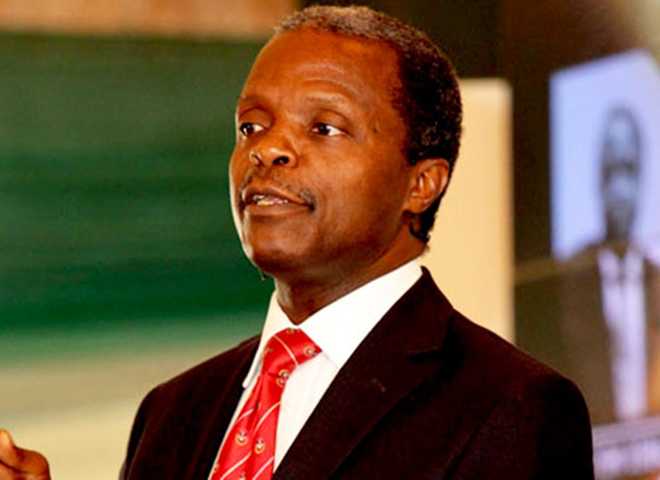Niger Delta: Osinbajo and Boroh’s seamless coordination
Vice-President Yemi Osinbajo was in the Niger Delta region recently again in continuation of his efforts to find a lasting peace in the area as well as the country at large. The series of these visits go without saying that the current administration has placed a great premium on issues bedevilling the oil-rich region that […]


Vice-President Yemi Osinbajo was in the Niger Delta region recently again in continuation of his efforts to find a lasting peace in the area as well as the country at large.
The series of these visits go without saying that the current administration has placed a great premium on issues bedevilling the oil-rich region that houses Nigeria’s single-major source for foreign trade.
The number of visits of key members of this administration to the region underscores President Muhammadu Buhari’s determination to finally put an end to crises in that region.
However, the success recorded in the region cannot be highlighted without mentioning the efforts of the office of the Special Adviser to the president on Niger Delta and Coordinator of the Amnesty programme, retired Brigadier-General Paul Tarela Boroh, who assiduously continues to provide the fertile ground for the administration’s ambitious programmes for the region to bear the expected results.
Indeed, such mediations have started yielding the expected results as the country is now reaping from the peace in the region by exporting the targeted crude oil to the international market for the first time in about three years.
And this is coming at a time when the Organisation of Oil Producing Countries (OPEC) decided to cut down on volume of crude oil production of some countries. There has been a steady increase in Nigeria’s foreign reserve, according to the Central Bank of Nigeria.
In view of that, the need to consolidate the gains of the peace in the region is paramount and that informed the renewed push of the Office of the Special Advisor to the President on Niger Delta/Coordinator of the Amnesty programme to further cement the already established link between the presidency and leaders of the region.
After the visits to Delta, Bayelsa and Rivers states, the vice-president also visited Edo State, where he held a townhall meeting with critical stakeholders in the state and assured them of the government’s unwavering intent to see a “new way of doing things” regarding the issues of the region.
Present at the meeting were the three oil producing local government areas in the state and other interest groups who discussed with the acting president on the way forward for peace and development.
Osinbajo’s message to the stakeholders was resounding. He said: “This is an important engagement; we are not taking it lightly at all. The time we have spent in the past few days going from community to community shows that it is a serious engagement. We are committed to every one of the things we say we want to do.”
Certainly, for government to achieve that, a workable template must be developed. And that is why the Special Advisor has done and continues to do the ground work shuttling between the communities in the six Niger Delta states, aggregating their views and demands and channelling them to the presidency.
The cumulative result of Major-General Boroh’s agricultural programme for the youth of the region as well as other sundry initiatives is evident in the country’s increasing crude oil output.
According to the Guardian newspaper’s report in January, 2017, “Nigeria’s crude oil output increased by about 403,900 barrels per day (bpd) to 1.940 million bpd in December 2016, above November levels of 1.536 million bpd, according to the current figures released by Organisation of the Petroleum Exporting Countries (OPEC).’
The newspaper said “Compared to third quarter 2016, 1.2 million bpd output, the boost in production is attributed to the federal government’s overtures to militant groups in the oil-rich Niger Delta region, to pave the way for a comprehensive dialogue with a view to resolving all the issues.”
It is pertinent to mention here that the activities of vandals and militants in the oil-rich region had caused the country to lose as high as 900,000 bpd in early 2016, out of the benchmarked 2.2 million barrels in the year’s budget.
This did not however go unnoticed as the convener of the Niger Delta People’s Congress, (NDPC), High Chief Mike Loyibo, declared a permanent peace in the region, owing to the frequent and consistent tours of the vice-president to meet the stakeholders, which proved to be unprecedented in the history.
Major General Boroh’s audacious moves also led to the ceasefire of the Niger Delta Avengers, whose agitations and bombings of oil pipelines caused the government some sleepless nights. This also caught the attention of the NDPC convener, who said, “when we assess the issues generally, my view has been that you can’t develop the Niger Delta without her people’s participation and this is the first time that any government is involving the critical stakeholders at all levels and so the consultation is a continuous one.
“The Vice President visited Delta State, Bayelsa State, Rivers State and he was also in Imo State. As a saying goes, to whom much is given, much is also expected. What the president expects from the indigenes of the region is to pay back by maintaining the current peace’’.
With Major-General Boroh as the head steering the peaceful resolution of all the contentious issues in the region, having himself also come from the area, agitators and militants should give this government the chance to implement its programmes to the latter. There is no need to entertain doubt or engage in another unjustifiable agitation.
Ibrahim Umar Babangida is of No 1 Quito Close, Yadseram Crescent, Maitama, Abuja
